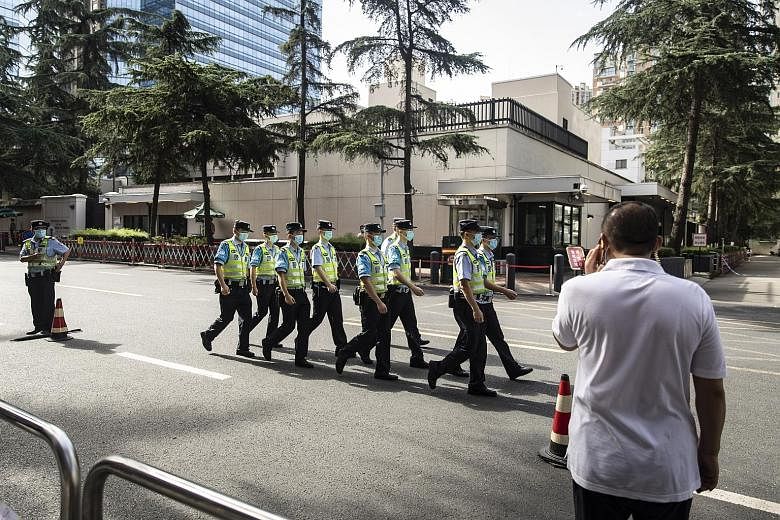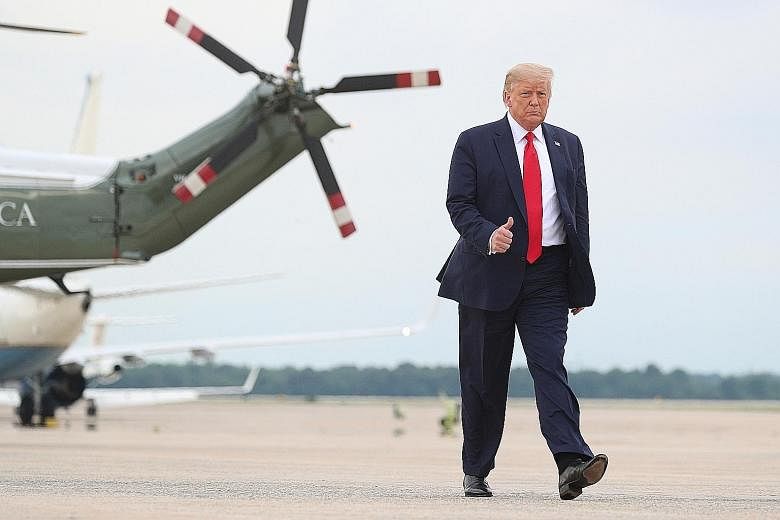WASHINGTON • Step by step, blow by blow, the United States and China are dismantling decades of political, economic and social engagement, setting the stage for a new era of confrontation shaped by the views of the most hawkish voices on both sides.
With US President Donald Trump trailing badly in the polls as the presidential election nears, his national security officials have intensified their attack on China in recent weeks, targeting its officials, diplomats and executives.
While the strategy has reinforced a key campaign message, some American officials, worried Mr Trump will lose, are also trying to engineer irreversible changes, according to people familiar with the thinking.
Chinese President Xi Jinping has inflamed the fight, brushing aside international concern about the country's rising authoritarianism to consolidate his own political power and to crack down on basic freedoms, from Xinjiang to Hong Kong.
By doing so, he has hardened attitudes in Washington, fuelling a clash that at least some in China believe could be dangerous to the country's interests.
The combined effect could prove to be Mr Trump's most consequential foreign policy legacy, even if it is not one he has consistently pursued: the entrenchment of a fundamental strategic and ideological confrontation between the world's two largest economies.
A state of broad and intense competition is the end goal of the President's hawkish advisers. In their view, confrontation and coercion, aggression and antagonism should be the status quo with the Chinese Communist Party, no matter who is leading the US next year.
They call it "reciprocity".
Secretary of State Mike Pompeo declared in a speech last Thursday that the relationship should be based on the principle of "distrust and verify", saying the diplomatic opening orchestrated by then President Richard Nixon nearly half a century ago had ultimately undermined American interests.
"We must admit a hard truth that should guide us in the years and decades to come: that if we want to have a free 21st century, and not the Chinese century of which Xi Jinping dreams, the old paradigm of blind engagement with China simply won't get it done," Mr Pompeo said. "We must not continue it and we must not return to it."
The events of the last week brought relations to yet another low, accelerating the downward spiral. Last Tuesday, the State Department ordered China to shut down its Houston consulate, prompting diplomats there to burn documents in a courtyard.
Last Friday, in retaliation, China ordered the US to close its consulate in the south-western city of Chengdu. The Chinese Foreign Ministry the next day denounced what it called "forced entry" into the Houston consulate by US law enforcement officers last Friday afternoon.
In between, the Department of Justice announced criminal charges against four members of the People's Liberation Army for lying about their status in order to operate as undercover intelligence operatives in the US. All four have been arrested. This comes on top of a month in which the US administration announced sanctions on senior Chinese officials, including a member of the ruling Politburo, over the mass internment of Muslims; revoked the special status of Hong Kong in diplomatic and trade relations; and declared that China's vast maritime claims in the South China Sea were illegal. The administration has also imposed a travel ban on Chinese students at graduate level or higher with ties to military institutions in China.
Officials are discussing whether to do the same to members of the Chinese Communist Party and their families, a sweeping move that could put 270 million people on a blacklist. "Below the President, Secretary Pompeo and other members of the administration appear to have broader goals," said Mr Ryan Hass, a China director on former president Barack Obama's National Security Council who is now at the Brookings Institution. "They want to reorient the US-China relationship towards an all-encompassing systemic rivalry that cannot be reversed by the outcome of the upcoming US election," he said.
"They believe this reorientation is needed to put the United States on a competitive footing against its 21st-century geostrategic rival."
NYTIMES


